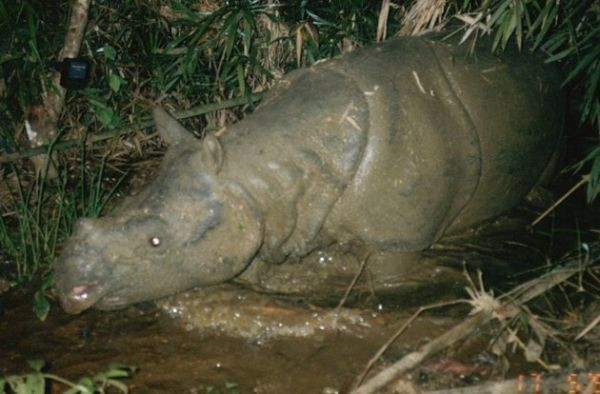Javan Rhinos are One Step Closer to Extinction

Vietnam has failed to save its rare population of Javan rhinos as hunters have killed the country’s last Javan rhinoceros for its horn, bringing one of the world’s most endangered species closer to extinction.
The 40 to 60 Javan rhinos living in Ujung Kulon National Park in Indonesia are the last known living Javan’s in the World.
Genetic analysis of rhino feces had confirmed that at least two rhinos where living in Vietnam’s Cat Tien National Park in 2004, raising hopes that the two, together, could save the Javan population in Vietnam.
Vietnam’s Cat Tien National Park has had no sightings, footprints or dung from live rhinos since the last known animal living there was found dead last April, shot through its leg with its horn chopped off, the World Wildlife Fund told the Associated Press.
As land transformation and local population in Vietnam rose, threatening the animal’s habitat, the population of Javan rhinos started to shrink.
Poaching and lack of effective park management and patrols hastened the decline, the coordinator of WWF’s Asian Elephant and Rhino Program, Christy Williams, told the AP.
"It appears that protection is not being given a high priority by the Vietnamese government," he said.
Park director Tran Van Thanh said that it is impossible for the rangers to stop all of the estimated 100,000 people living near the park from hunting exotic animals when the average farmer earns around 150,000 dong equaling $7.50 per day.
"We're not trying to avoid our responsibility in the death of the rhinos, but we've done our best to protect them," Thanh said.
Twenty-two of the rhino's dung piles were found in Cat Tien from October 2009 to February 5, 2010, but no dung piles or fresh rhino footprints were seen in the subsequent nine weeks, the report said.
WWF and the International Rhino Foundation confirmed that the last rhino had died in Vietnam by collecting and analyzing its feces.
Javan horns can sell for up to $50,000 per pound as they are in high demand among Vietnamese and Chinese cultures that believe it can cure an array of ailments.
A small amount of ground-up powder can bring hundreds of dollars on the black market, the WWF says.
Global demand has also increased in the last four to five years as some people have begun to consider rhino horn a remedy for cancer, Williams said.



























